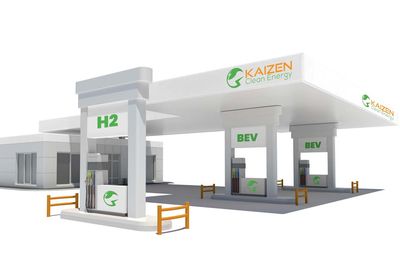fueling the future
Houston mobile hydrogen generator company gets PE backing to expand its business

The company, based in Tomball, has developed a mobile, scalable energy source that can be used anywhere, anytime. Image via kaizencleanenergy.com
An innovative Houston-area company is on a mission to make using hydrogen energy easier and cheaper.
A recently announced partnership with investment firm, Balcor Companies, will help make this a reality as Kaizen Clean Energy looks to make hydrogen energy more accessible, reliable and affordable. Announced July 6, Balcor now has an ownership stake in Kaizen. The terms of the deal were not disclosed.
The company, based in Tomball, has developed a “micro grid” hydrogen power station — a mobile, scalable energy source that can be used anywhere, anytime.
Balcor Companies Founder and Director Chris Balat says his company is looking at their stake in KCE as an investment in shaping a more sustainable world.
“We are thrilled to make our first foray into the energy sector with Kaizen Energy as our trusted partner,” he says in a statement. "Our association with Kaizen is a testament to our commitment towards a sustainable future, driving positive change in the world while delivering value to our stakeholders.”
Kaizen's mission is to succeed where electric grids fail. One fallback source to help strained electric grids has typically been diesel generators. However, diesel generators increase local emissions which produce a significant amount of air pollution and health concerns. Kaizen’s hydrogen generators can be used to power buildings, homes, hospitals, data centers, events, and farm equipment. They are portable, which means it does not require any excessive infrastructure.
“Our system allows customers the ability to have renewable energy anywhere in the world in a very short time frame,” said Eric Smith, co-founder of KCE. “For EV charging, for power generation, to replace a diesel generator.”
Smith tells EnergyCapitalhtx the concept is very attractive to corporations who lease buildings as building out a permanent infrastructure could be costly and time consuming.
Robert Meaney, a Texas Tech engineering graduate, founded Kaizen Clean Energy in 2020, along with Eric Smith and Craig Klaasmeyer. Meaney designed the technology using a mixture of methanol and water to create hydrogen. A 330-gallon tank of the mixture produces about 150 kilograms of hydrogen — or 1.6 megawatt-hours of energy. The mixture lowers the risks of many of the drawbacks of hydrogen usage. For example, it can be stored for longer periods and transported long distances safely.
The microgrid fits into a small container and can be dropped on site at remote locations or in heavily congested grid areas. It also eliminates the cost of hydrogen transportation by generating hydrogen on-site with commonly available methanol, which can be both used for hydrogen fuel and converted to electricity for electric vehicle charging. This microgrid technology can both connect to the grid to supplement available power, or can be used during a power outage.
To put this energy source to use, KCE has partnered with Extreme E, an international off-road racing series that is part of Formula 1 and uses electric SUV’s to race in remote parts of the world. Kaizen’s units are also being used at a fleet-charging location in Los Angeles.